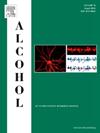在大鼠中,持续的炎症不会促进抗厌恶性的狂饮
IF 2.9
4区 医学
Q3 PHARMACOLOGY & PHARMACY
引用次数: 0
摘要
慢性疼痛是致残的主要原因,显著降低生活质量,并与物质使用障碍(包括酒精使用障碍)高度共病。这在一定程度上是由于酒精的缓解疼痛作用是AUD进展和维持的潜在驱动力。尽管有大量的历史、轶事、临床和流行病学证据支持酒精的镇痛功效,但很少有临床前研究调查疼痛对自愿饮酒的影响。此外,迄今为止还没有研究在持续疼痛的情况下调查厌恶抵抗性饮酒。方法为了弥补这一文献空白,本研究将奎宁掺杂与狂饮样饮酒(DID)模型相结合,评估完全弗氏佐剂(CFA)诱导的持续性炎症对雌性和雄性Long Evans大鼠厌恶抵抗性狂饮样饮酒的影响。结果:与我们实验室之前的研究结果一致,尽管雌性大鼠在基线和CFA did后确实消耗了更高水平的酒精,但CFA并未影响两性的狂饮性饮酒。同样,CFA也不影响奎宁掺杂的狂饮性饮酒。结论:本研究首次探讨了持续性炎症对厌恶性饮酒的影响。虽然我们没有发现CFA对奎宁掺假的狂饮样饮酒的影响,但这些发现为未来研究疼痛-酒精关系的这一未被研究的方面提供了基础。本文章由计算机程序翻译,如有差异,请以英文原文为准。

Persistent inflammation does not promote aversion-resistant binge-like alcohol drinking in rats
Background
Chronic pain is a leading cause of disability, significantly decreases quality of life, and is highly co-morbid with substance use disorders, including alcohol use disorder (AUD). This is due, in part, to the pain-relieving effects of alcohol acting as a potential driving force for the progression and maintenance of AUD. Despite a substantial body of historic, anecdotal, clinical, and epidemiological evidence supporting the analgesic efficacy of alcohol, few preclinical studies have investigated the effects of pain on volitional alcohol drinking. Further, no studies to date have investigated aversion-resistant drinking in the context of persistent pain.
Methods
To address this gap in the literature, the current study combined quinine adulteration with the drinking in the dark (DID) model of binge-like alcohol drinking to assess the effects of complete Freund's adjuvant (CFA)-induced persistent inflammation on aversion-resistant binge-like alcohol drinking in female and male Long Evans rats.
Results
Consistent with previous findings from our laboratory, CFA did not affect binge-like alcohol drinking in either sex, although female rats did consume greater levels of alcohol during baseline and post-CFA DID sessions. Similarly, CFA did not affect quinine adulterated binge-like alcohol drinking in either sex.
Conclusions
This study is the first to investigate the impact of persistent inflammation on aversion-resistant alcohol drinking. Although we found no effects of CFA on quinine adulterated binge-like alcohol drinking, these findings provide the groundwork for future investigations into this otherwise unstudied aspect of the pain-alcohol relationship.
求助全文
通过发布文献求助,成功后即可免费获取论文全文。
去求助
来源期刊

Alcohol
医学-毒理学
CiteScore
4.60
自引率
4.30%
发文量
74
审稿时长
15.6 weeks
期刊介绍:
Alcohol is an international, peer-reviewed journal that is devoted to publishing multi-disciplinary biomedical research on all aspects of the actions or effects of alcohol on the nervous system or on other organ systems. Emphasis is given to studies into the causes and consequences of alcohol abuse and alcoholism, and biomedical aspects of diagnosis, etiology, treatment or prevention of alcohol-related health effects.
Intended for both research scientists and practicing clinicians, the journal publishes original research on the neurobiological, neurobehavioral, and pathophysiological processes associated with alcohol drinking, alcohol abuse, alcohol-seeking behavior, tolerance, dependence, withdrawal, protracted abstinence, and relapse. In addition, the journal reports studies on the effects alcohol on brain mechanisms of neuroplasticity over the life span, biological factors associated with adolescent alcohol abuse, pharmacotherapeutic strategies in the treatment of alcoholism, biological and biochemical markers of alcohol abuse and alcoholism, pathological effects of uncontrolled drinking, biomedical and molecular factors in the effects on liver, immune system, and other organ systems, and biomedical aspects of fetal alcohol spectrum disorder including mechanisms of damage, diagnosis and early detection, treatment, and prevention. Articles are published from all levels of biomedical inquiry, including the following: molecular and cellular studies of alcohol''s actions in vitro and in vivo; animal model studies of genetic, pharmacological, behavioral, developmental or pathophysiological aspects of alcohol; human studies of genetic, behavioral, cognitive, neuroimaging, or pathological aspects of alcohol drinking; clinical studies of diagnosis (including dual diagnosis), treatment, prevention, and epidemiology. The journal will publish 9 issues per year; the accepted abbreviation for Alcohol for bibliographic citation is Alcohol.
 求助内容:
求助内容: 应助结果提醒方式:
应助结果提醒方式:


